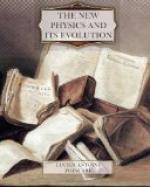Deeming this check irremediable, many contemporary physicists give up attempts which they look upon as condemned beforehand, and adopt, to guide them in their researches, a method which at first sight appears much more modest, and also much more sure. They make up their minds not to see at once to the bottom of things; they no longer seek to suddenly strip the last veils from nature, and to divine her supreme secrets; but they work prudently and advance but slowly, while on the ground thus conquered foot by foot they endeavour to establish themselves firmly. They study the various magnitudes directly accessible to their observation without busying themselves as to their essence. They measure quantities of heat and of temperature, differences of potential, currents, and magnetic fields; and then, varying the conditions, apply the rules of experimental method, and discover between these magnitudes mutual relations, while they thus succeed in enunciating laws which translate and sum up their labours.
These empirical laws, however, themselves bring about by induction the promulgation of more general laws, which are termed principles. These principles are originally only the results of experiments, and experiment allows them besides to be checked, and their more or less high degree of generality to be verified. When they have been thus definitely established, they may serve as fresh starting-points, and, by deduction, lead to very varied discoveries.
The principles which govern physical science are few in number, and their very general form gives them a philosophical appearance, while we cannot long resist the temptation of regarding them as metaphysical dogmas. It thus happens that the least bold physicists, those who have wanted to show themselves the most reserved, are themselves led to forget the experimental character of the laws they have propounded, and to see in them imperious beings whose authority, placed above all verification, can no longer be discussed.
Others, on the contrary, carry prudence to the extent of timidity. They desire to grievously limit the field of scientific investigation, and they assign to science a too restricted domain. They content themselves with representing phenomena by equations, and think that they ought to submit to calculation magnitudes experimentally determined, without asking themselves whether these calculations retain a physical meaning. They are thus led to reconstruct a physics in which there again appears the idea of quality, understood, of course, not in the scholastic sense, since from this quality we can argue with some precision by representing it under numerical symbols, but still constituting an element of differentiation and of heterogeneity.




